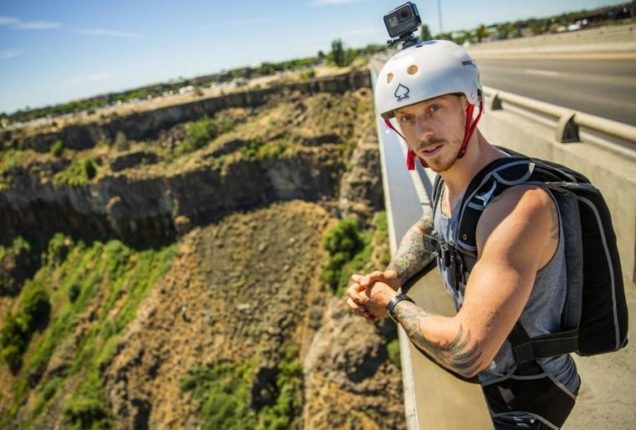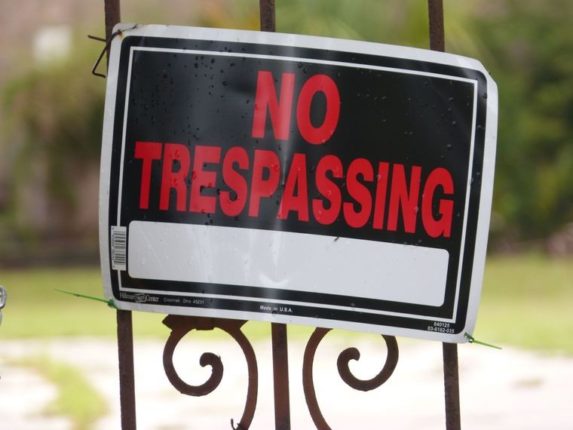TWIN FALLS — It’s a bird! It’s a plane! It’s an adventurer plummeting nearly 500 feet down into the Snake River Canyon!
It’s summer in the Magic Valley, and that means BASE jumping season. While some outdoorsmen and -women choose to seek their thrills via raft or mountain bike, others prefer to leap off the Perrine Bridge with a parachute.
The canyon’s scenic views attract visitors from all over the world to Twin Falls. But it also offers a prime jump site year-round for those who want to experience the rush of hurtling, then floating, through the air.
BASE jumping, a sport that involves jumping with a parachute from a building, antenna, span (such as a bridge) or earth (such as a cliff) is considered more extreme than skydiving: you’re jumping from a lower altitude, giving you less time to pull your parachute or work out any issues you may have in the air.
The act of jumping off a bridge or cliff, with or without a parachute, is inherently risky. But there are fewer accidents in Twin Falls than you might think.
The sheriff’s office has responded to 17 calls for BASE jumping-related incidents since the beginning of 2017, Lt. Daron Brown said. Most of those calls are from jumpers who have landed wrong and hurt their leg or ankle. Calls for fatal accidents, Brown said, are rare.
“Compared to the number of jumps that go off the bridge every day, they’re very uncommon,” Brown said, noting that on some days as many as 100 jumps will take place on the Perrine Bridge.
Last month, a female BASE jumper in Twin Falls was flown to Boise with “serious but not life-threatening” injuries after she landed several hundred feet from the landing pad.
The relatively low percentage of jumps gone wrong may be due in part to the fact that many first-time solo BASE jumpers already have some experience falling through the air. It’s recommended that a person have about 200 skydives under their belt before they attempt BASE jumping solo, though there are no official rules or regulations.
Legally, somebody with no experience could buy their own gear and jump off the bridge — but it’s “not very smart,” said Marc Lambert, owner of Twin Falls BASE.
Lambert offers courses to people interested in taking the leap alone for the first time. Most of his clients are skydivers, he said, and many come from out of the state or country.
His four- to five-day courses include the practical basics, such as packing a parachute, landing patterns and how to jump in the right position and from the correct angle.
Other aspects of the course, such as discussions on the ethics of BASE jumping — “just being a good person, not burning bridges, respecting the areas and the objects” — are less technical. He also teaches his clients relaxation calming techniques, such as breathing exercises, in case nerves kick in once they’re up on the ledge.
“A lot of it is mental,” Lambert said. “If you’re going to jump off a bridge, it can kind of mess with your mind a little bit.”
The mental aspect of the sport shouldn’t be underestimated, said Sean Chuma, a professional BASE jumper who has completed more than 5,400 jumps over his career.
“A lot of it has to do with a person’s mindset and type of personality,” Chuma said. “You have to be open to the possibilities and have your mind prepared for whatever can happen. Sometimes people get in a little bit over their head.”
Chuma, owner of Tandem BASE in Twin Falls, offers both solo lessons and a tandem jumping service to beginners. He said his college degree in psychology has come in handy as an instructor.
“I understand the emotions involved,” Chuma said. “I can tell when I need to either use the yoga voice or use a bit more tension.”
Because tandem jumpers are strapped onto an instructor, they don’t need any prior skydiving experience, and the preparation is less intense, consisting mostly of some basic rules and guidelines. Chuma’s customers over the years have included Dorothy Custer, who did a tandem jump in 2013 when she was 102.
The goal of tandem jumping is to “share the sport,” Chuma said.
“It’s a small group of people, and all you can do is wonder what it’s like for these crazy people who go and jump off of stuff with parachutes,” Chuma said. “Once you see it…it really does change your perspective of why someone would do such a thing.”

